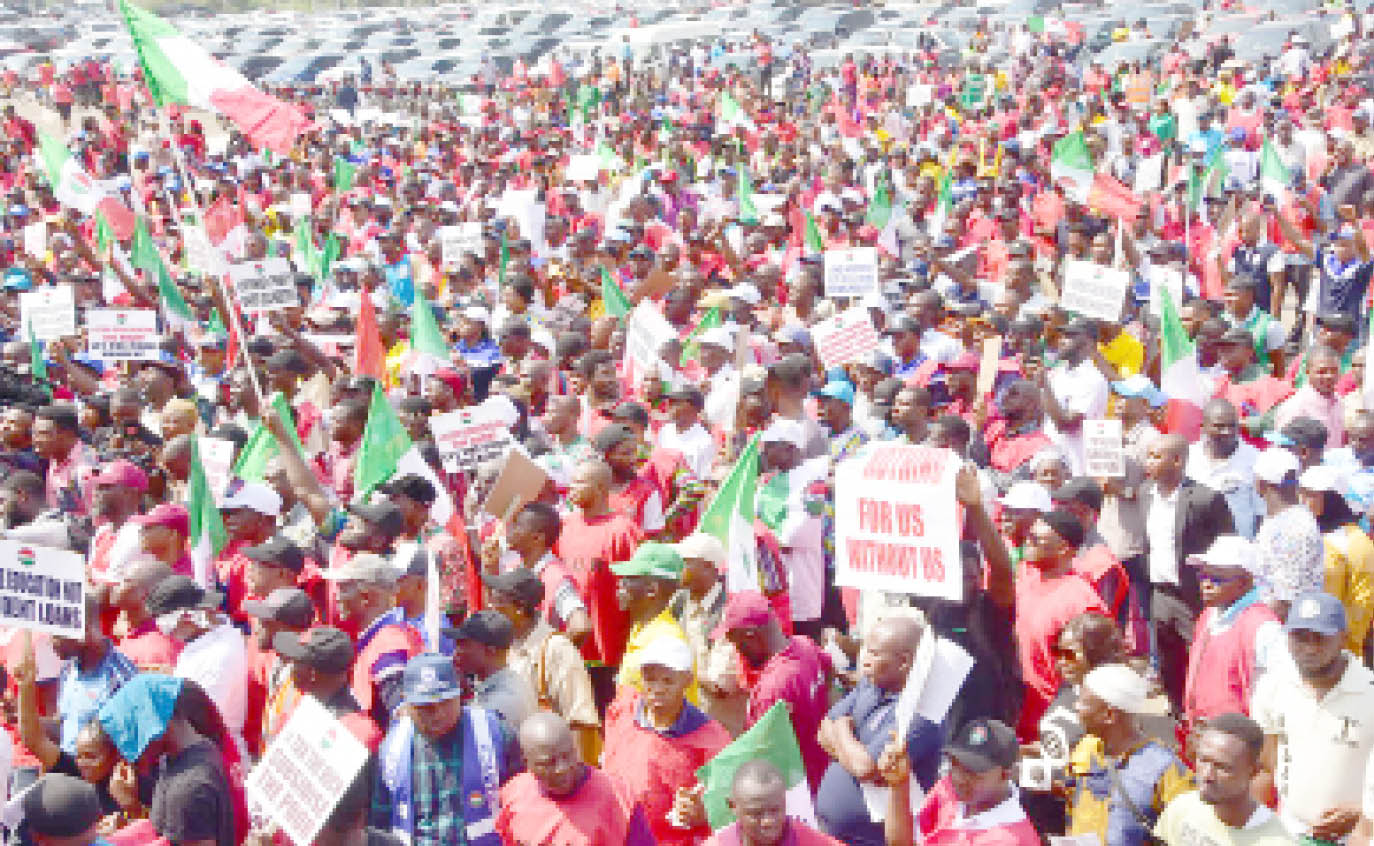Unpacking the logic of labour union activism in Nigeria
Incessant strikes by labour unions, from the Academic Staff Union of Universities (ASUU) to the Nigeria Labour Congress (NLC), have become a regular staple in Nigeria’s litany of underdevelopment characteristics. The current labour action – demand for a realistic minimum wage – is waged on the platform of the argument that government has the means […]

NLC members protesting againsts cost of living crisis at the National Assembly Complex, Abuja yesterday
Incessant strikes by labour unions, from the Academic Staff Union of Universities (ASUU) to the Nigeria Labour Congress (NLC), have become a regular staple in Nigeria’s litany of underdevelopment characteristics.
The current labour action – demand for a realistic minimum wage – is waged on the platform of the argument that government has the means of paying the new wage it proposed. But the government and even the organised private sector think labour’s proposal is unrealistic.
That argument is founded on a range of interconnected economic realities and dynamics, ranging from payroll cost as percentage of budget, dwindling national revenue earning and consequent fiscal deficit, the huge national indebtedness and the imperative need, to attracting more investible capital, Nigeria’s anomalous federal system that is further challenged, and the challenges of affordability for some states and all the local government areas.
Between the back-and-forth negotiations is the hanging question: What happens to wage increment that a galloping inflation is waiting to invalidate? Yet, the issues involved in the adversarial conflict between the Nigerian government and labour transcend wage increment.
Let us lay the cards on the table upfront. One of the key objectives of any state’s development policy must necessarily be the achievement of industrial harmony as a first critical condition for creating the enabling climate for growing an economy standing on very weak substructures.
The wasteful governance architecture that supports Nigeria’s non-developmental federalism is unarguably a major binding constraint to successive governments’ development performance since the 1970s. This resulted from the unguarded multiplication of public institutions, accentuated by the prodigal and geometric increases in state creation and local government structures, as well as a pervasive national indiscipline in policy, programme and project implementation. This makes it institutionally inevitable to de-escalate the cost of governance implication of this development.
It is between this need to enhance (labour) productivity while limiting government expenses that labour and government often generate the adversarial industrial relations conflict that inevitably further undermine national productivity efficiency.
One of the most significant conversation labour and the government need to have is around the role of the state in national development, and what implications a redefinition of the role of government in managing the development process would have for structure, function and service delivery business model of the entire public service. This is the starting point for a comprehensive reengineering that will ignite the paradigmatic shift in the national productivity profile.
The productivity movement will be facilitated by two correlative institutional reform projects. The first is through a waste management strategy managed with new productivity metrics that compel each sector of the economy to set productivity targets that is embedded in the national development plan and managed within framework of performance bond.
The second urgent institutional reform both labour and the government need to focus on is critical unbundling of the public sector workforce through deep-seated re-skilling, re-professionalisation and the injection of high-end skills that appropriate funds hitherto expended on external expertise and consulting services.
The collective bargaining that will hammer out the intricacies of these issues and deliver a living wage must not be taken out of the context of fiscal federalism that has become a contentious constitutional matter in Nigeria.
There is no iota of fairness, for example, in any attempt to fix a national minimum wage within the context of federating states that are fiscally the same. It does not make any sense that workers in Lagos, Gombe, Rivers and Osun states will be earning the same minimum wage.
And imposing that wage on local government areas that are still enmeshed in a governance palaver with states drives the unfairness deeper. Government and labour must necessarily take heed to the principle of affordability that conditions wage negotiation in a federal system.
Finally, the negotiation cannot also be taken out of the context of technical-rational practices of collective bargaining, especially within a developing context like Nigeria that is struggling to deliver the dividends of democratic governance.
This is to say two things – industrial actions like strikes must be circumscribed by constitutional legality and reasonability. The current adversarial or “aluta” militant labour unionism bothers on treasonable criminality that allows a small percentage of workforce to hold the entire country to ransom.
It is only a lack of humanity that will allow an industrial action to totally paralyse essential services like health care and electricity via the shutting down of the national grid, one that eventuate unnecessary deaths and paralyses. However, if government must initiate legislation that will rein in this sort of excessive industrial action, it must also come to equity with clean hands. This implies that government must approach the collective bargaining table with a genuine policy action to undertake the unbundling of the overall government costs and expenditure structures through productivity audit. This will not only put the labour unions on a footing of mutual understanding (outside of the political undercurrents of the justified labour activism), but also articulate a distinct template that correlates the state of Nigeria’s economy with demands for increase in wages. The capacity to reach a consensus depends on coming to the collective bargaining table with full disclosure.
Olaopa is the chairman, Federal Civil Service Commission
